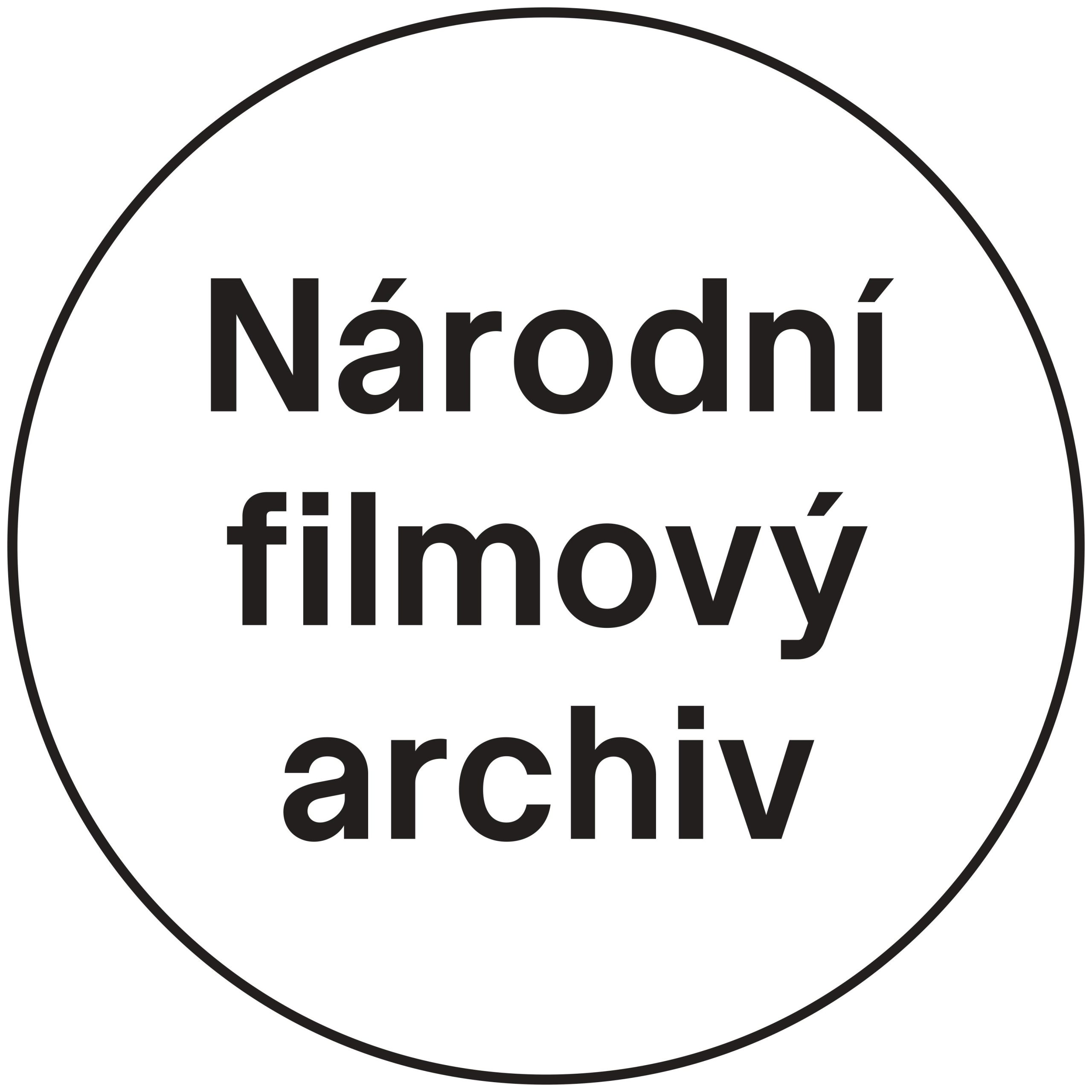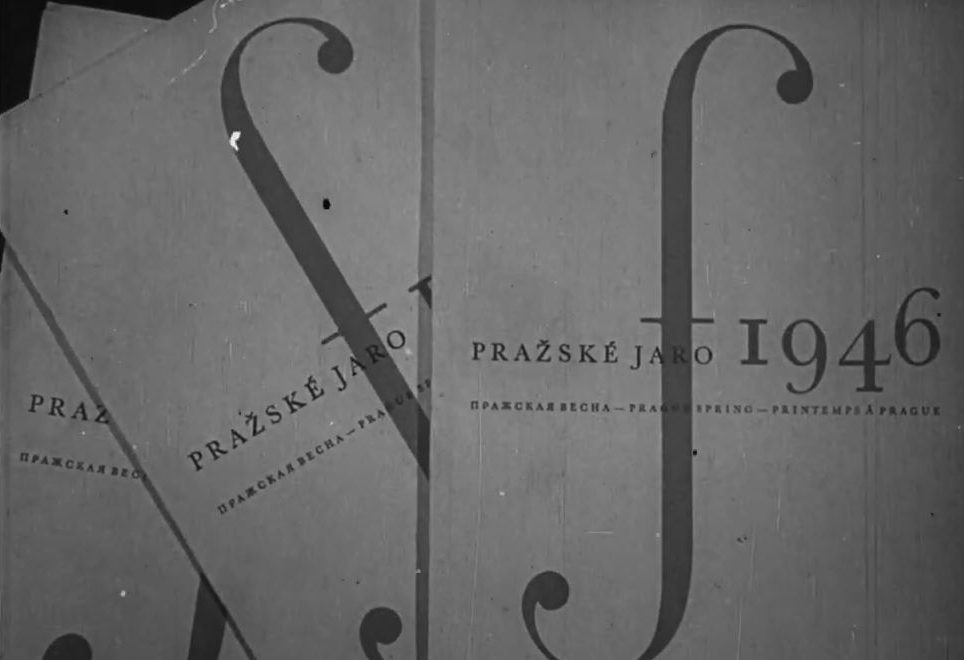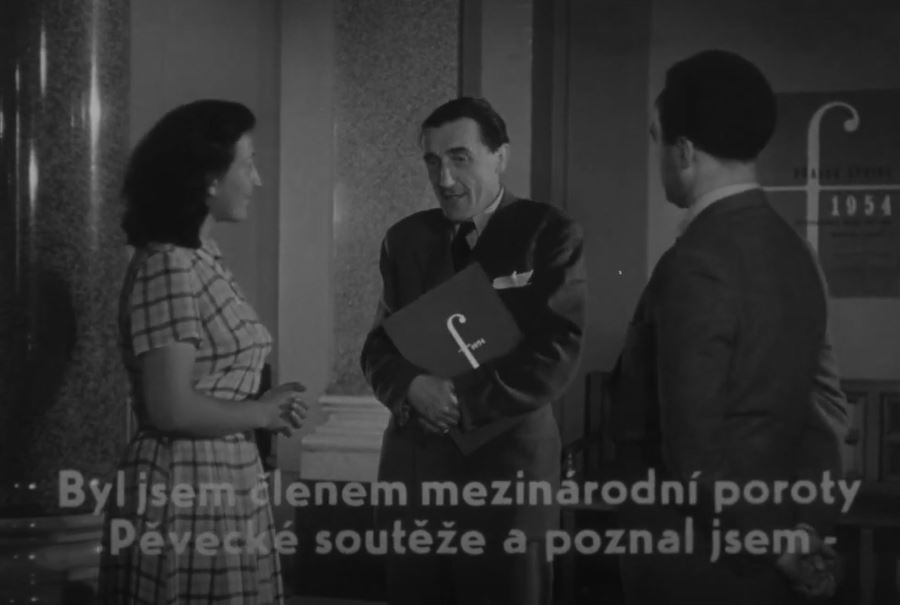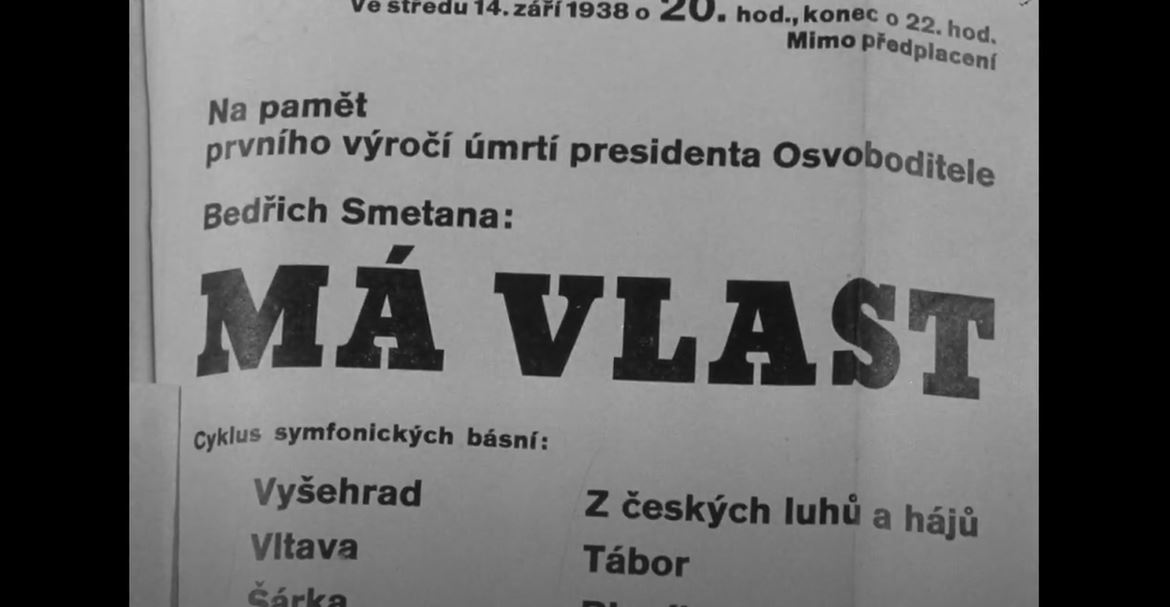Unique film films from the Prague Spring Festival in the National Film Archive
On the occasion of this year’s Prague Spring Festival, until the end of June the National Film Archive is granting access to ten short documentary films and weeklies that are more or less directly connected with the festival. The films showing the festival during several different years (including the inaugural festival in 1946) are supplemented by material filmed for a production at Laterna magiky (The Magician’s Lantern) promoting the Prague Spring Festival, the documentary film Hudba v srdci Evropy (Music in the Heart of Europe) about the rich musical tradition in the Czech lands, and a film about the history and development of the Czech Philharmonic.
“The individual films reflect how the role of the festival was transformed from 1946 until the late 1960s. From the years just after the war, enthusiasm and love for music still shine forth to this day. Some of the films are marked by the ideology of the period while others strongly bear the hallmarks of their authors and of their technical approach. We are offering all the digitised films in an unaltered form, so they show traces of the time that has passed since they were introduced,” says National Film Archive general manager Michal Bregant about making the films available.

1946: In the presence of Edvard Beneš and Jan Masaryk
After the war, the inaugural international music festival began at the Rudolfinum with the Czech Philharmonic and the conductor Rafael Kubelík playing Antonín Dvořák’s Symphony No. 7 in D minor Op. 70.
Edvard Beneš and his wife were in the audience. The Yugoslavian conductor Krešimir Baranović led the Czech Philharmonic in the Balladic Suite for large orchestra, Op. 9 by Eugen Suchoň. The Calvet Quartet from France played Maurice Ravel’s String Quartet in F major. Leading the Czech Philharmonic were the Canadian conductor Jean Beaudet, the American composer and conductor Leonard Bernstein, and the British conductor Adrian Boult. The orchestra accompanied the English pianist Moura Lympany in John Ireland’s Piano Concerto in E flat major.
At the Royal Summer Palace (Belvedere), a performance of the Symphony in C major by Josef Mysliveček was given by a wind quintet of Czech Philharmonic players and the Prague Wind Quintet with the conductor Jaroslav Krombholc. Viewers were able to see Jan Masaryk and his sister in the audience. Representing French music were the conductor Charles Munch and the pianist Nicole Henriot in César Franck’s Symphonic Variations for piano and orchestra and the violinist Ginette Neveu in Ernest Chausson’s Poéme. Yevgeny Mravinsky presented Soviet music with Dmitri Shostakovich’s Symphony No. 5 in D minor, Op. 47. Also, the violinist David Oistrakh and the pianist Lev Oborin played the Violin Sonata No. 8 in G major, Op. 30/3 by Ludwig van Beethoven.
Jan Masaryk gave a speech (dubbed) to close the festival, and he expressed his appreciation for the musicians of the Czech Philharmonic, which had been founded fifty years earlier. Rafael Kubelík conducted the Czech Philharmonic in Leoš Janáček’s Sinfonietta, bringing the inaugural international music festival to a close.

1947: Bernstein, Šostakovič, Gulda, Fournier
At the second annual international music festival, the Rudolfinum welcomed President Edvard Beneš. The Czech Philharmonic led by Rafael Kubelík opened the Prague Spring Festival with Antonín Dvořák’s Cello Concerto in B minor, Op. 104 played by the French cellist Pierre Fournier.
The third concert of the Czech Philharmonic featured Claude Debussy’s composition La mer, trois esquisses symphoniques pour orchestre under the baton of the Swiss conductor Ernest Ansermet. Charles Munch conducted the fourth concert of the Czech Philharmonic, and an excerpt is heard from Arthur Honegger’s Symphony No. 3 (“Liturgical”). Václav Talich led the Czech Chamber Orchestra in the Symphony in D major (“Prague Symphony”) by Wolfgang Amadeus Mozart. Jan Kühn led a children’s choir, which sang Songs of the Chods with the composer Dalibor C. Vačkář accompanying at the piano.
The Chinese artist Chow Shiao-Yen sang Song of Youth – The Red Pea by Liu Shea-Ana with Alfred Holeček playing the piano accompaniment. Friedrich Gulda played the first movement of the Piano Sonata No. 32 in C minor, Op. 111 by Ludwig van Beethoven. At the fourth concert of the Czech Philharmonic, the violinist Ricardo Odnoposoff played A. K. Glazunov’s Violin Concerto in A minor, Op. 82 with the conductor Leonard Bernstein. Dmitri Shostakovich was present in person at the concert of the Czech Philharmonic, where Yevgeny Mravinsky conducted his Symphony No. 8 in C minor, Op. 65.
The concluding concert featured Leoš Janáček’s Glagolitic Mass with the soloists Beno Blachut and Eduard Haken accompanied by the Prague Philharmonic Choir led by Jan Kühn and the Czech Philharmonic conducted by Rafael Kubelík.

1949: Kühn, Loveday, Kleiber
The film documents the course of the 1949 Prague Spring Festival. Shots from the concert halls at the Rudolfinum and the Municipal House alternate with panoramic views of Prague. There are shots of the appearance of Jan Kühn conducting his Children’s Choir, Jan Fadrhons conducting the Band of the Castle Guards, and the Czechoslovak Radio Men’s Choir.
Next are shots from the announcement of the competition of young violinists for the Jan Kubelík Prize and their performances accompanied by the Prague Symphony Orchestra and the conductor Václav Smetáček. Then there are appearances by the Budapest Philharmonic led by János Ferencsik and by the Prague Wind Quintet. At the conclusion, we hear Ludwig van Beethoven’s Ode to Joy played by the Czech Philharmonic with the conductor Erich Kleiber.

1950: Kondrašin, Richter, Oistrach
The film shows some of the concerts at the 1950 Prague Spring Festival taking place in Litomyšl and Prague. After opening shots of a May Day parade in Prague with President Klement Gottwald waving to the crowd, there are shots from the actual concerts. At the concert in Litomyšl we hear the symphonic poem From Bohemia’s Woods and Fields from Bedřich Smetana’s cycle Má vlast (My Country) played by the Orchestra of the National Theatre with the conductor Jaroslav Krombholc.
Next is an excerpt from Smetana’s opera The Bartered Bride in the park by the castle. In the audience are the Czechoslovak Minister of Education Zdeněk Nejedlý and the pianist Emil Gilels. The following excerpt is from Prague, where we hear the Old World Quintet in the garden of the Břevnov Monastery. There are shots from the meeting of the government ministers Václav Kopecký and Zdeněk Nejedlý with Soviet artists including the conductor Kirill Kondrashin.
At the Municipal House, Vittorio Gui conducts Johann Sebastian Bach’s B Minor Mass, then Annie Fischer plays Franz Liszt’s Piano Concerto in E flat major. Next, at the cello competition, Daniil Shafran plays Robert Schumann’s Cello Concerto, then Sviatoslav Richter and David Oistrakh appear. Hermann Scherchen conducts the Czech Philharmonic in Ludwig van Beethoven’s Ninth Symphony.

1954: Konwitschny, Tallich
The 1954 Prague Spring Music Festival began with an international singing competition with 76 young artists from nine countries vying for the Emma Destinn and Karel Burian Prize. Rehearsals took place at the Rudolfinum with piano accompaniment. At the actual competition, Antonín Dvořák’s song Když mě stará matka (Songs My Mother Taught Me) was compulsory in the first round. Czechoslovak singers won the three top prizes.
The Leipzig Gewandhausorchester appeared at the Municipal House with Dvořák’s Symphony in G major under the baton of Franz Konwitschny. The ceremonial conclusion of the festival took place at the National Theatre, where the Smetana Quartet played Bedřich Smetana’s First String Quartet “From My Life”. In the Smetana Hall of the Municipal House, Václav Talich conducted the Czech Philharmonic in Antonín Dvořák’s symphonic poem The Wild Dove. The film ends with an except from the Glagolitic Mass by Leoš Janáček with the Brno Radio Symphony Orchestra conducted by Karel Šejna.

1955: Cluytens, Kleiber, Mravinskij, Campoli
At the Rudolfinum, the laureates of the Hanuš Wihan Prize are announced from the cello competition. Rain forced the concert of the Chinese Folk Instrument Ensemble to be moved from the Wallenstein Garden to the Municipal House. Next are musical excerpts from J. S. Bach’s St John Passion played by the Gewandhausorchester and the Thomanerchor boys’ choir led by Günther Ramin and Leoš Janáček’s Sinfonietta with the Brno Radio Symphony Orchestra led by Břetislav Bakala.
We also hear P. I. Tchaikovsky’s Violin Concerto in D major, Op. 35 with the British violinist Alfred Campoli accompanied by the Prague Symphony Orchestra and the conductor Václav Smetáček. The event of the festival was the concert of the Czech Philharmonic with the Austrian-Argentine conductor Erich Kleiber.
Jean Pierre Rampal gave a flute recital in the Knights’ Hall at the Wallenstein Palace. Next is a morning rehearsal of Maurice Ravel’s Rhapsodie espagnole with the Czech Philharmonic and the French conductor André Cluytens. The Smetana Quartet plays Ludwig van Beethoven’s String Quartet No. 1 in F major, Op. 18/1. The last filmed excerpt is of Pyotr Ilyich Tchaikovsky’s orchestral fantasy Francesca da Rimini, Op. 32 played by the Leningrad Philharmonic with the conductor Yevgeny Mravinsky.
The second part of this filmed news report titled U mladých výtvarníků – With Young Artists – deals with preparations for a school exhibition of the works of students at Academy of Fine Arts.

1956: Mozart’s Prague Spring Festival
The film documents the course of the 1956 Prague Spring Festival, devoted to W. A. Mozart; concerts with that theme took place on the stages of several Prague theatres and at the Municipal House. There is an excerpt from Mozart’s marionette opera Apollo et Hyacinthus at the Central Marionette Theatre followed by shots of Zdeněk Chalabala conducting the opera Don Giovanni and of Antonio Janigro with Solisti di Zabreb. Julius Katchen plays a Mozart piano sonata, and the Beethoven Quartet (from the former USSR) plays his Eine kleine Nachtmusik. We also hear the Vienna Symphony Orchestra playing the famed Symphony No. 40 in G minor, and the Prague Philharmonic Choir appears at St Vitus’s Cathedral with the Prague Symphony Orchestra under the baton of Heinz Finger in Mozart’s Coronation Mass.

1960: Promotional film of the Prague Spring Festival in the style of Laterna magika
A young pair of lovers takes a poetic stroll through Prague, during which they visit the National Gallery on Hradčany Square. The purpose of the film was to promote the Prague Spring Festival, so it largely consists of musical motifs and views of the Czech capital city. This film was made for use at the National Theatre venue Laterna magiky (The Magician’s Lantern), where performances employed the principle of perfectly integrating live dancing with film projections. At EXPO 1958 in Brussels, the material was presented using the polyekran system. Since 1960, it has been adapted as part of a film titled Zájezdový program (Tour Programme), with content projected onto three screens (left, centre, and right).

1967: Music in the heart of Europe
This documentary film is about the rich musical tradition of the Czech lands. The film presents Bohemia and Moravia as the birthplaces of leading composers (Mysliveček, Smetana, Janáček, Dvořák, Martinů etc.) and as a place where foreign musicians found inspiration (Mozart, Beethoven…). It introduces viewers not only to the development of music, but also to the works of famous musicians, their native land, and the places where they worked. The film also contains shots from the 1967 Prague Spring Festival: the Prague Radio Symphony Orchestra playing Hector Berlioz’s Requiem, Op. 5 at St Vitus’s Cathedral.

75th anniversary of the founding of the Czech Philharmonic
This documentary film was made on the occasion of the 75th anniversary of the founding of the Czech Philharmonic. It informs the viewer about the orchestra’s history and development, and it was mainly intended for the foreign public. The journalist Ivan Medek (1925-2009), originally a professional musicologist, collaborated on making the film as an expert advisor.







